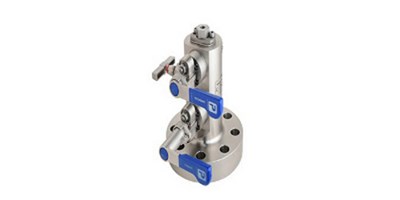A diverse range of process to instrument valves and connections aimed at eliminating potential leak paths for the oil and gas industry is being highlighted at ADIPEC by the Instrumentation Products Division of Parker Hannifin, the motion and control technologies company.
The company will be showing the latest additions to its extensive monoflange and Pro-Bloc ranges of block and bleed valves, including versions that comply with the Class A ultra-low-emission requirements of the international ISO 15848 standard, together with a new range of flushing ring integrated into existing double block and bleed technology that eliminate the need for individual components such as stand-alone flushing ring and ball valve.
Parker’s monoflange and Pro-Bloc valves are designed to couple instrumentation to the process lines as closely as possible, and to eliminate any use of threaded components. By combining all necessary primary and secondary valves on a single one-piece body, which mounts directly onto a process flange without the use of additional fittings, both series of products reduce the number of potential leak paths substantially.
Installation of remote instruments usually involves use of conventional tubes and fittings implying that NPT taper threads, together with PTFE tape or anaerobic sealant, will feature at some point along the path. Since these types of connections can compromise system integrity and cause contamination problems, Parker offers solutions for eliminating them whenever possible. This design goal can be achieved on both Parker monoflange and Pro-Bloc valves the instrument outlet connections can incorporate single- or two-ferrule compression type tube fittings.
Parker goes to considerable lengths to ensure the material used for its process to instrument valves is of the highest quality. Each flange is forged from a single piece of grain flow-controlled steel. As standard, they can be fabricated from A105 carbon steel, AF350 LF2 low-temperature carbon steel, A182-F316 stainless steel, and A182-F51 duplex stainless steel. Optional corrosion-resistant materials include super duplex, Monel, Hastelloy, 6Mo and Incoloy 625, subject to the physical layout constraints of the installation.
Parker will also be showing a new series of solenoid valve range for actuators control appliances to achieve -40°C ambient temperature and full material traceability.


